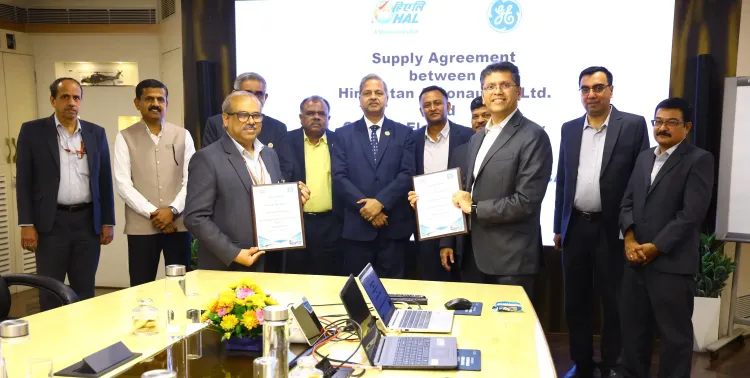Did HAL Secure a Deal with General Electric for 113 Jet Engines to Power the Tejas Mk1A Fleet?

Synopsis
Key Takeaways
- HAL's partnership with GE strengthens India's defense capabilities.
- The deal includes 113 jet engines for the Tejas Mk1A.
- Engine deliveries are expected from 2027 to 2032.
- The Tejas Mk1A is pivotal for India's Aatmanirbhar Bharat initiative.
- HAL is also expanding into civil aviation.
New Delhi, Nov 7 (NationPress) In a major milestone for India’s homegrown fighter jet initiative, Hindustan Aeronautics Limited (HAL) on Friday finalized a contract with the US-based General Electric (GE) for the provision of over 100 jet engines to power the Light Combat Aircraft (LCA) Tejas Mark-1A.
According to a post shared on X, HAL confirmed that the agreement entails the delivery of 113 F404-GE-IN20 engines, accompanied by a comprehensive support package, aimed at fulfilling the requirements for the subsequent order of 97 Tejas Mk1A aircraft. The engine deliveries are slated to occur between 2027 and 2032.
HAL stated on X, "Hindustan Aeronautics Limited (HAL) has entered into a partnership with M/s. General Electric Company, USA, on November 7, 2025, for the supply of 113 Nos of F404-GE-IN20 engines along with a support package for the 97 LCA Mk1A programme."
The state-owned aerospace giant recently secured a fresh contract in September for 97 Tejas Mk1A fighters—comprising 68 single-seater and 29 twin-seater variants—with a total expenditure exceeding Rs 62,370 crore. Deliveries under this agreement are projected to commence in FY2028 and conclude over the subsequent six years.
The Tejas Mk1A, crafted by the Aeronautical Development Agency (ADA) and manufactured by HAL, signifies a substantial leap forward in India’s ambition for self-sufficiency in defense production under the 'Aatmanirbhar Bharat' initiative.
In another stride, HAL is broadening its presence in the civil aviation arena.
Last month, the company formalized a memorandum of understanding (MoU) with Russia’s Public Joint Stock Company United Aircraft Corporation (PJSC-UAC) to collaboratively manufacture the SJ-100 regional aircraft in Moscow.
The SJ-100, a twin-engine narrow-body jet, is already operational, with over 200 aircraft currently in use across 16 commercial airlines globally. HAL emphasized that this collaboration will significantly enhance India’s regional air connectivity under the government’s UDAN scheme.
"SJ-100 will revolutionize short-haul connectivity in India. Under this agreement, HAL will possess the rights to manufacture the aircraft," the company conveyed.
HAL anticipates that India’s aviation sector will require more than 200 jets in this category over the next decade to bolster regional connectivity.
Additionally, approximately 350 more aircraft may be essential for the Indian Ocean region to cater to nearby international tourist destinations.









